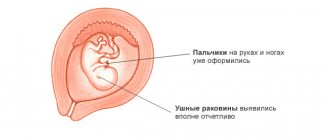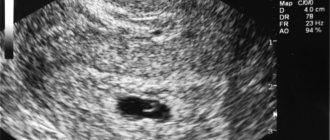The 24th week of pregnancy is the sixth obstetric month.
If you look at the pregnancy calendar -> pregnancy by week, then 162-168 days have passed since conception. More than half of the pregnancy has already passed, and the changes that have overtaken the body are visible very clearly. The 24th week of pregnancy is a period when you can enjoy your position, because everyone around you is already noticing this, but you can still feel great. Toxicosis, which torments many at the beginning of pregnancy, has passed, and the difficult period of ending pregnancy has not yet arrived.
Of course, not everyone can be in excellent condition; during this period, many complain of fatigue in the limbs and back, because women still have to work at 24 weeks of pregnancy. Also, frequent trips to the toilet can interfere with your previous life, because you need a ladies' room nearby. A growing belly pushes the stomach more and more, this can cause heartburn, which will last until the end of the term. The only thing that can alleviate the condition a little is proper nutrition in small quantities.
Changes accompanying the 24th week of pregnancy
The 24th week of pregnancy is marked by a significantly larger belly, although this does not prevent the woman from leading her usual rhythm of life. But the expectant mother needs some time to get used to the child growing inside her. You should stand up, sit down, and walk with caution.
The future woman's gait changes, and all movements are smooth, somewhat slow. And this is normal, since at 23-24 weeks of gestation a sharp weight gain is observed. The center of gravity of the body, as well as the angle of inclination of the pelvis, also changes, shifting somewhat, thereby forcing the woman to move slightly differently.
Principles of rational nutrition for a pregnant woman
To prevent these problems from occurring at each stage of pregnancy, it is necessary to adjust the diet of the expectant mother. First of all, you need to exclude from the diet the following foods that do not bring any benefit to the woman’s body and the baby in the womb:

What pregnant women can and cannot eat
- fried foods that are cooked with a lot of oil or fat. May cause heartburn, constipation, and lead to weight gain;
- smoked, pickled dishes, large amounts of salt, which directly affect the formation of edema in a woman, which is caused by fluid retention in the tissues of the body (can you pick pickled vegetables?);
- coffee and strong tea, which can cause heartburn;
- products containing preservatives, flavors and dyes. They do not benefit both the woman’s body and the normal development of the baby in the womb. First of all, such products include mayonnaise, ketchup, margarine;
- large amounts of sugar, baked goods and confectionery products made from white flour, sweet and carbonated drinks. They lead to obesity and can provoke the development of pregnancy diabetes or candidiasis;
- insufficiently thermally processed meat, fish, eggs. In this case, pathogenic microorganisms may remain in the products, which provoke the development of dangerous diseases.
The expectant mother's meals at any stage should be fractional. It is strictly forbidden to consume large portions at a time, which significantly complicates the normal digestion process. In this case, the expectant mother may feel unwell, heaviness in the stomach, heartburn, and nausea may appear. Moderation in nutrition is something that every pregnant woman should adhere to.
What pregnant women should not eat
It is also necessary to avoid eating 3-4 hours before bedtime. At the same time, dinner should be as light as possible and consist of foods that are quickly digested and do not create unnecessary stress on the digestive tract.
Many doctors recommend that every pregnant woman, regardless of the time of year, take complex vitamins. They will prevent vitamin deficiency and help in the normal development of the child. Also, the expectant mother will not have problems with hair loss, peeling nails or damaged teeth. These phenomena are observed when there is an insufficient amount of vitamins and minerals, which can be eliminated with regular use of multivitamin complexes.
It's easy to be pregnant with Karina Kharchinskaya
Fetus at 24 weeks of gestation
What happens to the baby at 24 weeks of pregnancy? This is already a small man, his appearance has been formed, all internal organs have completed their development, and now it’s time for reflexes. The baby already feels everything, the taste that comes to him from the food eaten by his mother, joy, anxiety, light, darkness. Already at 24 weeks of pregnancy, the baby inside can be awake for about 4-6 hours a day, and this can happen when the mother is sleeping. Its tremors can already be clearly felt, they can even be seen by those around you with the naked eye. With his movement, he can often show his dissatisfaction, for example, his mother’s position is uncomfortable for him or he is hungry. It is worth listening to the tremors and recognizing the secret messages of the unborn child.
Principles of treatment
The main treatment of the disease should be aimed at eliminating the symptoms: runny nose, cough, sore throat, general weakness of the body. To do this, you need to try the following methods:
- To treat a runny nose, use a solution of salted water. A runny nose cuts off the child’s oxygen supply, so it must be dealt with. The solution is prepared as follows: 1 tsp. salt is added to half a glass of clean water. The solution is used to rinse the nose, and you can also instill the medicine into the nose.
- Sore throats are treated with hot drinks, for example, milk with 1 tsp. honey For rinsing, decoctions of sage or chamomile are used.
- Dry cough is treated with inhalations, which promote expectoration of mucus. After the procedure, you need to wrap yourself up well and go to bed.
- It is not recommended to bring down the high temperature yourself; you should entrust this matter to specialists. It is considered high after 38 degrees, before which the body itself tries to cope with the problem.

You need to gargle with chamomile and sage decoctions
ARVI at 24-25 weeks of pregnancy can occur at any time of the year. Always stay prepared by strengthening your immune system with healthy foods and a regular daily routine, and it can also help to do pregnancy exercises.
We also recommend: Fever during a cold in early pregnancy
Laboratory tests and examination at 24 weeks of pregnancy
- If a woman did not undergo a scheduled examination by the gynecologist observing her at 22-23 weeks, it is required at 24 weeks.
- The 2nd planned ultrasound will show whether or not the fetus has defects and abnormalities in growth and development, and if the doctor has certain suspicions, he will refer the woman for genetic screening.
- During the examination, the doctor compares the degree of development of the fetus and its size accepted at this stage of pregnancy.
- The baby’s heartbeat is also listened to – the rate of beats per minute should be 180.
- They conduct a study of the condition of the amniotic fluid itself and the general condition of the placenta.
- They also take a set of measurements of the pregnant woman - her weight and abdominal volume, measure the height of the uterine fundus, and take blood and urine for examination.
Sample menu for the day
The nutrition of a pregnant woman at 14 weeks can be organized as follows:

Average daily diet of a pregnant woman
- breakfast. Buckwheat, millet, corn porridge, oatmeal with the addition of milk or butter. You can also drink a cup of tea or coffee with milk, eat toast with a piece of hard cheese;
- lunch. A piece of boiled chicken with green pea puree. An alternative option is a bun with a glass of milk;
- dinner. Soup with vegetables in meat broth, boiled tongue with vegetable stew, compote or juice;
- afternoon tea Cottage cheese with fruit or cottage cheese casserole, unsweetened tea;
- dinner. Vinaigrette with boiled fish, tea with cookies;
- second dinner. Omelette with vegetable salad, rosehip broth or compote;
- snacks. Fruits, nuts, berries.
Nutrition according to this scheme will fully provide the expectant mother with all the necessary microelements and vitamins. The 24th week of pregnancy is the period during which you need to carefully monitor your diet.
Next: Nutrition for a woman at 25 weeks of pregnancy
Note to moms
The 24th week of pregnancy is the period when many pregnant women experience depression. The body has taken on big changes, the appearance has changed, and many people panic because they are afraid of gaining weight. Many things begin to irritate you, you want culinary delights, but you shouldn’t eat your depression with them.
- It is imperative to adhere to proper nutrition and its regimen, because constant meals in large quantities, especially late in the day, lead to excess weight gain, which will be difficult to get rid of later. And during pregnancy there is no need for excess weight.
- It is imperative that at the 24th week of pregnancy and after its end, the diet contains vegetables, fruits, meat, fish, dairy and fermented milk products, and cereals. A balanced diet will help your baby stay fit and develop well.
- Normal weight gain per week can be monitored independently using purchased electronic scales. It should be no more than 500 g in 7 days. Otherwise, you may be overweight, which you will have to fight with later.
Feelings of the expectant mother
So, you are twenty-four weeks pregnant and your appearance continues to change.
- The constantly growing uterus causes a shift in the center of gravity, and now a clumsy and clumsy gait and painful sensations in the lower back and back are added to the protruding tummy.
- Pain in the back and lumbar region occurs due to the softening of the supporting ligaments, which is necessary for future childbirth. Rest and light stroking in the back and lumbar area will help reduce such pain.
- Among other things, pain in the sacral area is considered normal during this period. They appear due to the divergence of the pelvic bones during the preparation of the female body for the upcoming birth. The safe passage of the baby through the birth canal depends on the expansion of the pelvis.
- If during this period a pregnant woman experiences unpleasant and painful sensations caused by the development of hemorrhoids, she should reconsider her own diet, choosing foods that are high in fiber and have a natural laxative effect.
Development before birth
Every day it becomes clearer that inside there is a little person who has his own demands, wants something or is opposed to certain things. Therefore, it is worth listening to your feelings at 24 weeks of pregnancy, and learning to understand the language of the baby in the womb. After all, his movements are not always random movements in the water. This probably says something. From this period, you can establish a connection through the mother’s tummy, stroking the baby, especially when certain parts of it stick out. He feels everything completely and will understand the care and affection that his parents want to convey to him.
Thus, you can calm a very active baby by placing your hands on the stomach and stroking it a little. The child will calm down and fall asleep from the pleasant sensations. It is imperative that the baby’s father participate in this process every day and also talk to him.
A child’s memory is so unique that the voices that he hears quite often in the womb are remembered even after birth. Therefore, in the presence of mom and dad, the newborn child will feel protected. By the same principle, it is necessary to include a variety of rhythmic music for your child, preferably classical. You will notice that he will move to her beat.
It is worth including reading a good fairy tale into your daily routine. If you don’t have time, then you can allow yourself to turn on audiobooks, of which there are now a lot on the Internet. All these activities will help develop brain activity, so that soon the child’s mind will be the same as that of a newborn.
Good to know
Anemia during pregnancy
In great shape
How to maintain your waist: what to do before and during pregnancy and after childbirth
Fetal movements during pregnancy: what do they mean and how to count?
Talking to your baby before, after and during childbirth
You can't move if you lie down? Exercise and pregnancy
Pregnancy and sports - by week: loads and contraindications
Physical education during pregnancy: safety rules
Physical education lessons for pregnant women
All texts for pages about mother and baby were kindly provided by RAMA Publishing - these are chapters from the book by Svetlana Klaas “Your Favorite Little Man from Conception to Birth”, reviewer Irina Nikolaevna Kononova, Candidate of Medical Sciences, Associate Professor of the Department of Obstetrics and Gynecology of the Ural State Medical Academy (Ekaterinburg).
Harbingers of childbirth
As at any time, at 24 weeks of pregnancy there is a risk of premature birth. A number of reasons may contribute to this. For example, leakage of amniotic fluid can be a serious warning sign. The bubble can burst so that all the water comes out, and then, unfortunately, the pregnancy cannot be saved, but it can leak out little by little, and then there is a chance that the baby will be born full-term, but for this you will need to do everything: it is under the strict supervision of doctors in the hospital , at rest, always lying down. This is the only way to save the pregnancy and reach a certain period of fetal viability. After all, if a baby is born at this stage, the chances that he will survive are almost negligible. The cause of this situation of water leakage at 24 weeks of pregnancy can be sexually transmitted infections. That is why it is worth giving importance to this important factor, as mentioned above.
What kind of discharge may be
Discharge in women at 24 weeks of pregnancy is a natural physiological phenomenon, but such leucorrhoea does not always indicate that the woman is healthy. Normal discharge is not too abundant, has a uniform consistency, and is light in color.
A sour odor is allowed, but it should not be significant. If the leucorrhoea changes color, volume or smell, there is a risk of infection. Then you need to contact an antenatal clinic to determine the cause of their occurrence.
Possible fungal and bacterial infections
In pregnant women at 24 weeks, infections such as vaginosis and thrush are common. To accurately determine whether there is any pathology, a smear is taken to study the microflora.
The main symptom of bacterial vaginosis is the appearance of watery leucorrhoea with a strong odor. This disease can affect the condition of the fetus and can cause premature birth, so at the first sign of infection, you should consult a doctor.
Another well-known disease is candidiasis. The main symptom is the appearance of white discharge, plaque on the vaginal mucosa. The pathology is accompanied by itching and burning. It may occur due to changes in microflora, as a result of the growth of Candida fungus.
It is not recommended to treat this pathology yourself. Based on the symptoms and test results, the doctor selects the optimal therapy that will not harm the unborn child.
Bloody issues
Brown discharge at week 24, as well as bright red secretion, may indicate placental abruption or placental previa. Such symptoms are dangerous for both the woman and the unborn child.

If such leucorrhoea appears, you should urgently call a doctor; it is possible that in order to cure the symptoms and avoid miscarriage or fading of pregnancy, treatment in a hospital will be required.
Yellow discharge at 24 weeks of pregnancy
Yellow discharge that has a yellowish color or tint may be normal, but to find out for sure whether there are any pathologies, you should consult a gynecologist.
In some cases, the color of leucorrhoea can be affected by hygiene products - soap for washing, as well as shower gels. In this case, you need to change them to hypoallergenic ones, without fragrances and dyes. Linen should be made from natural materials, hygiene procedures should be performed regularly.
The appearance of yellowish leucorrhoea may indicate the development of candidiasis. Then the discharge has a cheesy consistency and is accompanied by unpleasant sensations in the intimate area.
Dark yellow mucus occurs due to an inflammatory process. Often such leucorrhoea is accompanied by a pungent odor and can be caused by diseases such as gonorrhea, chlamydia and other STDs. Pathologies should be treated as soon as possible - there is a high probability that diseases can harm the child.
White discharge during pregnancy
During pregnancy, natural vaginal lubrication often appears. Often, odorless and colorless leucorrhoea, not accompanied by pain, is normal. However, sometimes white discharge indicates the development or progression of the disease.
Thrush has the main symptom of a whitish discharge that resembles flakes. At this time, the woman may feel tingling and itching. Candidiasis poses a danger to the fetus and requires therapy.

Sometimes whitish mucus indicates the development of an infection. They can be at any stage of gestation. The infection is dangerous not only for the woman, but also for the child. Negative consequences are possible in the form of complications of childbirth, infection of the child, and bleeding.
In some cases, mucus means termination of pregnancy. Then the secretion is enhanced and can change its shade to a dark color. Starting from week 24, this symptom may indicate that the baby has stopped developing inside the womb. With such a diagnosis at a later stage, an emergency caesarean section or induction of labor may be prescribed to save the baby and the woman.
Lack of hygiene or excessively frequent washing can change the nature of the mucus. An allergic reaction to additives in soap and sanitary pads can often occur. During pregnancy, the female body is especially sensitive, so you should replace products with ones that do not contain fragrances and dyes.
If water leaks
Abundant liquid leucorrhoea can signal leakage of amniotic fluid. In the period from 14 to 26 weeks this is especially dangerous. It can be difficult to recognize this pathology on your own.
To find out more accurately whether there is leakage, you can use special tests that are sold at the pharmacy. This determines whether there is amniotic fluid in the discharge.
This symptom can be caused by infection of the amniotic sac, trauma, or various infections inside the uterus. This condition requires medical intervention. Timely contact with a doctor increases the chance of maintaining pregnancy.










